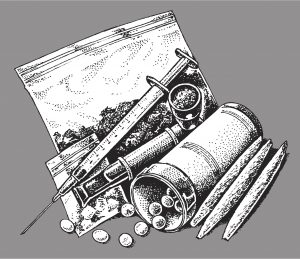by Sher Delva | Jun 20, 2017 | Addiction, Addiction Stigma, Drug Abuse, Mental Health, Stigma, Therapy, Uncategorized

Autopsy reveals Carrie Fisher had cocaine, ecstasy, and heroin in her system before death
Six months after Carrie Fisher’s death, new reports reveal the cause of death.
Coroner’s officials ruled that Fisher died from sleep apnea and a combination of other factors. The “Star Wars” actress fell ill on the plane last year, but investigators could not determine what impact drugs had on her death.
New Toxicology Reports
Now, toxicology reports reveal that Fisher had cocaine in her system and could have taken cocaine three days prior to the December 23 flight on which she had a heart attack. Fisher died four days after the flight.
The reports also say traces of heroin, other opiates, and ecstasy were found, but they could not determine when Fisher took these drugs. The findings were based on toxicology screenings taken when the “Star Wars” actress arrived at a Los Angeles hospital.
The full report contains a detailed explanation of the results, such as why investigations believe cocaine was taken by the actress at least three days prior to her flight. It also states that while heroin is detectable in the system for a briefer period of time, investigators could not determine when Fisher took it or ecstasy. Toxicology tests also found opiates in Fisher’s system, including morphine, although reports state this could be a byproduct of heroin.
“Ms. Fisher suffered what appeared to be a cardiac arrest on the airplane accompanied by vomiting and with a history of sleep apnea. Based on the available toxicological information, we cannot establish the significance of the multiple substances that were detected in Ms. Fisher’s blood and tissue, with regard to the cause of death,” the report states.
Other Potential Factors
Among the factors that contributed to Fisher’s death was the buildup of fatty tissue in the walls of her arteries, a condition known as atherosclerosis.
A phone message left for Fisher’s brother, Todd, was not immediately returned. Todd Fisher said in a statement Friday that he was not surprised
“I would tell you, from my perspective that there’s certainly no news that Carrie did drugs,” Todd Fisher said.
Carrie Fisher has been open about her drug use to the media and wrote about her struggles extensively. Many of the drugs were prescriptions by doctors to help Fisher overcome her mental health conditions, Todd Fisher noted. Fisher had long battled drug addiction and mental illness.
Fisher started smoking marijuana at 13, used LSD by 21, and was diagnosed with bipolar disorder at 24. Doctors treated her with medication and even electroshock therapy.
“I am not shocked that part of her health was affected by drugs,” Todd Fisher said.
So what was the cause of Fisher’s death?
Todd Fisher believes it was a combination of Fisher’s heart condition along with her smoking habits, and the medications she took.
“If you want to know what killed her, it’s all of it,” he said.
Carrie Fisher opened up in 2016 about her life-long struggles with insecurity. She admits she dealt with it extensively in the original “Star Wars” movie in the 70s. She even admitted to an affair with co-star Harrison Ford, at only 19 years old, in which she felt tremendous guilt.
Furthermore, Fisher has revealed challenges with body image after gaining weight. Before filming “Star Wars: Episode VII”, Fisher admits she was told to lose 35 pounds.
—
Fisher’s life has not always been easy. However, we will always love and appreciated her work. Addiction is a disease and should be treated as such. Fisher’s struggles are not a reflection of who she is as a person. She struggled with the disease of mental illness and addiction like many do. If you struggle with the same issues, please reach out. We want to help you before it is too late. Call now.
CALL NOW 1-888-922-5398
by Sher Delva | Jun 16, 2017 | Addiction, Mental Health, Mental Health Stigma, Stigma, Therapy

All over social media, articles with titles like “5 Ways to Know You’re an Introvert” or “Why Introverts Are Great to Date” continue to gain popularity. Suddenly, it seems like being an introvert is the latest trend. However, the reality is most people still do not know what it means to be an introvert
Many assume that introverts are simply shy people. This is far from the case. In fact, introverts are often actors, performers, and motivational speakers. Introversion has more to do with how you enjoy spending your time re-energizing, and not how shy you are.
Extroverts tend to re-energize by engaging in social activities like going out to eat with friends, or mingling at a party. While introverts may enjoy these activities, they do not find them to be energizing. Instead, they are likely to re-energize by staying home, reading a book, or meeting a friend one-on-one for coffee.
Everyone is different. Introversion and extroversion occur on a spectrum. No one person is completely an introvert or completely an extrovert. However, introverts tend to share certain traits and challenges. Recently, Heidi McGuirk, the co-founder of Revolutionary Health and life coach, opened up about what introversion means.
McGuirk affirms that it is crucial that introverts discuss their personality type with others. Otherwise, it is easy for relationships and friendships to suffer due to misunderstanding.
Introverts vs. Extroverts
McGuirk explains the difference between introverts and extroverts in by using her career as an example:
“The easiest way to explain it is my husband and I do the exact same thing for a living: we both speak, we both teach, we both do seminars and workshops. He can speak all day long, do an eight-hour training and at the end of that training, want to go out to dinner with as many people from that workshop as possible, and stay up and talk and continue to go,” she explains.
However, McGuirk does not respond the same way to social stimulation.
“After I do a workshop, whether it’s two hours or eight hours, I need to go home, fold the blinds, get cozy comfy and disappear and take a hot bath and kind of not talk to anyone.”
Why is there such a huge difference?
McGuirk explains it’s because introverts need to recharge. If this is not understood by all parties involved, it can often come across cold and aloof.
Another example she uses is when she and her husband go to Disney World with their toddler. While McGuirk loves to go to Disney World, at a certain point, she finds she must take a break from the constant stimulation.
“Being an introvert, I love being there, but there’s a certain point that I have at Disney that’s like the breaking point where I just need to kind of go find a spot to be alone, and just be by myself,” she explains.
It’s important to communicate this need, McGuirk says, because otherwise, the people around you will wonder what suddenly went wrong.
“If I don’t communicate that, it can look like 0 to 60 in a split second because I’ll be having fun and all of a sudden, uh-oh, I’ve reached my boiling point,” she says. “ If I don’t tell [my husband] what’s going on with me, he’s left scratching his head going, ‘What’s wrong with her? Is she bipolar or crazy? Or is it me?”
Instead of hiding, introverts need to expose themselves, rather than pretend. Introverts have a tendency to try to overcome their introversion through behaving like an extrovert. However, after a while, introverts burn out and cannot hide behind that façade anymore.
Why Introverts Detest Small Talk
Introverts have a need for solitude and a more focused communication style. It is important to explain those to others who lean on the more extroverted side, McGuirk explains.
Furthermore, introverts tend to detest small talk. Small talk is seen as wasted energy that introverts would rather save for more important, meaningful conversations. For example, introverts are not likely to want to have long, lengthy conversations with their server at a restaurant.
“A ten-minute conversation about fish drains me quicker than anything you can possibly imagine,” McGuirk admits.
On the other hand, introverts find they can withstand deeper conversations much easier.
“If you want to sit and talk about your childhood or if you want to talk about something deep and meaningful, I can do that all day,” she says. “But small talk depletes me.”
Introverts are the type of people who will go to a party or event and talk to one or two, instead of mingling around the room. Deep, meaningful conversations do not drain the introvert like small talk. An article in the Huffington Post explains that most introverts view small talk as meaningless conversation and view it as a barrier to more meaningful conversation.
Author Diane Cameron states, “Introverts crave meaning, so party chitchat feels like sandpaper to our psyche,” or like the depleting of precious, precious energy.”
Introverts Need to Expose Themselves to Friends
Introversion can seriously affect friendships. It is common for introverts to make plans with friends and want to cancel last minute because they desperately need to recharge their batteries.
“You might love your friends and want to be around your friends, but guess what, sometimes you make plans with your friends, and you instantly regret it,” McGuirk says. “But instead of communicating that, you make up a lame excuse or just don’t tell them anything at all, and they’re left wondering what’s wrong with them or what’s wrong with you instead of having an open communication.”
Introverts struggle with very extroverted friends because they feel over-stimulated.
“You might have a friendship that’s overwhelming to you where it’s too much; it’s too fast. It’s too much, it’s too intense, and they want to do stuff all the time,” she says.
Heidi McGuirk says it’s crucial to explain your personality type to these types of friends, so they know where you stand, instead of disappearing. Let them know that you have a threshold for stimulation, and the two of you must adjust to meet each other’s need.
“It’s important that you communicate that because if you don’t, you’re going to suck it down and suck it up and what will happen is eventually, you’ll be overstimulated, and you’ll blow up. You’ll reach a breaking point, and for many people, that’s actually when they start using other coping skills,” McGuirk says.
Communicate or Risk Negative Coping Strategies
These other coping skills may include numbing these desires for introversion with drinking, flaking, disappearing, isolating or cutting people off. Instead, introverts must make themselves a priority. They must expose themselves to others, so they are aware of these needs.
Introverts tend to be highly sensitive people who need time to process the world around them. Introverts do not need to be cured or fixed, and this is not possible regardless. Instead, they need to be understood, just like all types of personalities.
Are you an introvert or an extrovert? Have you discussed your personality type with those around you? Do not try to numb or hide your true self. Instead, expose who you truly are. If you are struggling with mental illness or addiction, please reach out. We want to teach you the right coping mechanisms. Call today.
CALL NOW 1-888-922-5398
by Justin Mckibben | Jun 6, 2017 | Addiction Stigma, Family, Parenting, Stigma, Teen Drug Abuse

(This content is being used for illustrative purposes only; any person depicted in the content is a model)
Having a family member or loved one struggling with drugs or alcohol is an incredibly tough place to be. For parents, it can be one of the most emotionally difficult experiences. Having a child who is using drugs or alcohol can be terrifying, but it can also cause a lot of internal conflict and self-doubt. Loved ones frequently find themselves looking for answers to questions they never knew to ask, and wondering how they can help make a difference. The parents of addicts have to face a lot of unique and intimate obstacles, but there are some very important things to remember when facing this painful situation.
To learn more about how to handle the difficult emotions and situations parents and family members face with an addicted loved one, download our FREE e-book
“What is the Difference Between Helping and Hurting”
DOWNLOAD FREE E-BOOK
Here are 5 things we want the parents of addicts to know.
-
You are not alone
When struggling with something as personal and as frightening as having an addicted child, people can feel separate from others. Many parents feel guilty, ashamed or embarrassed when their child is struggling with substance use disorder. This embarrassment or shame can lead to feelings of isolation.
The truth is there are countless families all across the nation going through the same thing. You are not alone. There are support groups specifically for the families and loved ones of addicts, and large networks of people seeking to provide information and support to parents of addicts who don’t know what to do or how to help.
In the face of the opioid epidemic in America, thousands of families have stepped up to advocate for better resources to educate the public about the dangers of addiction, and for better treatment opportunities. Nationwide organizations created by the parents of addicts fight to raise awareness, while treatment providers put an emphasis on the family being active in the recovery process.
-
It is not your fault
Of course parents take responsibility for their children, because it is their duty when they are born to protect them, raise them and help them grow to their potential. So it is no surprise that parents of addicts so often blame themselves for what their child is going through.
Many ask- what if I had been better? Should I have been more (or less) strict? Should I have been more (or less) affectionate? Parents of addicts can beat themselves up very easily with wondering what if, but the truth is it is not your fault.
Yes, many experts say there is a genetic predisposition, but everyone has one. It isn’t your genes, it’s a combination of unique DNA and unique circumstances. Yes, the environment matters, but again there is no one-size-fits-all formula to substance use disorder. People of all walks of life, in every neighborhood and from every kind of home suffer from addiction. Therefore, there is no exact parenting technique that can guarantee a child will never become addicted.
Most parents of addicts are the greatest version of a parent they possibly can be, but addiction does not discriminate. Helping more parents and family members to see this is another way we can overcome the stigma of addiction.
-
You can help overcome stigma
A lot of that shame and isolation we talked about above stems from the stigma of addiction. Some people still think substance use disorder is a moral failing or character flaw. They believe becoming addicted is a choice people made, not an illness people suffer from. This stigma makes people afraid to be open with others about their child’s addiction, which cuts them off from peer support.
It is important for the parents of addicts to help destroy the old stigmas that give people a false idea of what addiction really is. Parents have the power to share their experience, strength and stories of hope from a unique perspective. Addiction is one of the most misunderstood diseases in modern times, but the more parents of addicts share their stories, more awareness and understanding can help create innovations in treatment.
By being open about the difficulties your child has faced instead of hiding from it, not only can you be a warning to other families, but you can also empower them to understand that they too are not alone. Parents have a unique potential to stand up for their children and for each other to overcome stigma.
-
You have to take care of yourself
As a parent, it is absolutely understandable that your instincts tell you to put your own health and well-being after that of your child. But the reality is that if you are physically and emotionally exhausted, stressed out and unhealthy then there is no way you can provide the kind of help and support your child needs. You cannot be useful to anyone, especially your child, if you have not taken care of yourself.
If the parents of addicts can prioritize their own well-being, then they have the energy and resources to be more present and helpful to their addicted child. Allowing yourself to be as well as possible is not neglecting your loved one, it is preparing you for the opportunity to make a difference in their life.
This includes setting boundaries with your children, and being honest with them about what you are going through under these circumstances. It is not always easy, but it does matter.
-
We want to help!
At Palm Healthcare we want to make a difference in the lives of individuals and families who are struggling with drug or alcohol abuse and addiction. We believe in holistic healing as a stepping stone to real, lasting recovery. Palm Healthcare Company believes in the importance of uniting the parents, children, siblings and loved ones in the cause of progressive action toward amazing solutions that can not only save lives, but change them forever. For several years our facilities have worked to transform the lives of addicts and those closest to them.
Our Family Program is uniquely designed with healing for you and your loved one in mind. The Family Program focuses on improving communication, compassion, understanding and the overall support and of the entire family. We encourage all parents of addicts to research the Palm Healthcare Company Family Program and reach out to us with any questions.
Addiction doesn’t just affect the person who is drinking or drugging, it affects all those that are close to that person. Emotionally, physically, financially, the toll can be significant. If you or someone you love is struggling with substance abuse or addiction, please call toll-free now.
CALL NOW 1-888-922-5398
by Sher Delva | Jun 5, 2017 | Addiction, Addiction Stigma, Detox, Drug Abuse, Mental Health, Stigma, Therapy, Withdrawal

If you have gained a significant amount of weight after rehab, rest assured you are not alone. Like the freshman 15, gaining weight is practically expected. In fact, 65 percent of people gain weight after leaving rehab. Even more struggle with eating disorders, compulsive overeating, or what is now known as “food addictions.” What is the correlation and how can we get to the bottom of this?
First, we must look at the brain. Drug addiction and overeating have similar effects in the brain. When you were using drugs, it released happy chemicals like dopamine and serotonin which made you feel good. After becoming sober, you may find that you use food to acquire those same happy chemicals.
You might try to “replace” the high you felt from drugs with unhealthy foods. Foods high in fat, sugar, and calories tend to initiate a quick dopamine response in the brain. Unfortunately, like drugs, this happy feeling does not last long. Eventually, you crash and then try to eat again to achieve that same feeling. Substituting food for drugs or alcohol may lead to compulsive overeating and yes, weight gain.
Weight gain can be a source of personal suffering for some, and may even lead to a relapse. It can also contribute to health consequences like heart disease, high blood pressure, and diabetes. It is important to address the reasons why you have gained weight in recovery. Nutrition is crucial in the early stages of recovery, so it is important to recognize when you are not taking care of yourself properly.
Five common reasons people struggle with weight gain during recovery:
-
Stress
Stress is a risk factor for overeating. In the early stages of recovery, you may find yourself under a lot of stress, and now you do not have your drug of choice to mask those feelings. Research has shown time after time how stress can lead to overeating. For many, stress can lead to compulsive overeating and obesity.
-
Lack of Dopamine
One major reason for overeating is a lack of dopamine receptor in the brain. When the brain is low in dopamine, it affects impulse control and emotional regulation. Most people with any addiction have a lack of dopamine in the brain. The brain does not instantly recover once you stop using. In the absence of drugs for this reward mechanism, food becomes the next best thing. Weight gain inevitably follows.
-
History of Eating Disorders
Another reason for weight gain is a history of eating disorders before entering rehab. Dual diagnosis in rehab is extremely common. Many enter rehab with other psychological conditions including eating disorders. Almost 40 percent of women in recovery meet the criteria for an eating diagnosis. Men in treatment also experience binge eating and weight gain, especially in the beginning as they seek to satisfy cravings for drugs and alcohol. Few treatment centers screen their clients for eating disorders, so this is often not addressed once the recovering addict exits treatment.
-
Untreated Depression or Anxiety
As stated above, dual diagnosis is very common in treatment. Many addicts enter treatment with a history of anxiety and depression. Treatment for mood disorders can help reduce the risk of overeating related to these co-occurring disorders. Often, anxiety and depression can lead a person to overeat in an attempt to relieve themselves of these emotional hardships. Overtime, overeating occurs which leads to weight gain.
-
Nutritional Deficiencies
In some ways, weight gain after recovery is not a bad thing. Many recovering addicts are nutritionally deficient after detoxing from drugs. Chances are, there eating behaviors and lifestyle choices were not healthy while using. Eating can be a way of restoring your mind and body back to health. It is important to eat the right foods, however overstressing about weight gain should not be your main concern after leaving treatment. Your body may just be in a healing process. Your priority should be staying sober.
Despite the importance of nutrition in recovery, it is uncommon for treatment facilities to address it. It is important to go to a facility that incorporates wellness into the recovery process. While in treatment, take steps to eating healthy and exercising so that it becomes a lifestyle change upon leaving treatment.
There are steps that you can take to improve your overall health and well-being. Talk to your doctor about supplements you can take to help make the process easier. We encourage you to develop a healthy eating and exercise plan while you are in treatment. The staff at your facility may be able to help you along this process.
Overall, being mindful of your health while in treatment and after treatment is important. If you have gained weight after rehab, do not fret. Simple changes can turn it all around.
CALL NOW 1-888-922-5398
by Sher Delva | May 31, 2017 | Addiction, Addiction Medicine, Addiction Stigma, Drug Abuse, Mental Health, Stigma

Termination of employment document
One question many ask before going to treatment is whether or not they can keep their jobs after treatment. The decision to go to treatment is a challenging one and often, conflicts like separation from family, current employers, and financial hardships prevent some from making the crucial decision to go to treatment.
If you are struggling with substance abuse, all these areas are already being negatively affected by your addiction. Your employer may already suspect that you have an issue with substance abuse. If they do not, it is a smart idea to address the issue before it progresses to interfering with your employment.
We understand that you have concerns about seeking treatment, but you risk everything—including your job— if you do not seek treatment for your alcohol or drug problem. Your addiction has become unmanageable, and it is crucial you address it to sustain a healthy life.
Can I lose my job if my boss knows that I need treatment?
The Americans with Disabilities Act (ADA) protects employees from being discriminated against because of a disability. People who struggle with the disease of alcoholism are considered to have a disability under ADA guidelines. However, the guidelines do get tricky. If your job performance declines because of your drinking, your employer has the right to terminate you because of poor work performance.
Actively using illegal drugs is not protected by the ADA. However, the act does protect someone who has gone through drug rehab and is not using or has a history of drug use but is in recovery. You employer has the right to test you for drugs, but they cannot ask about your history of addiction. Therefore, it is best to seek recovery and live a sober life to avoid failing a drug test and losing your job.
But will my job be held while I am getting treatment?
The ADA does provide guidelines to protect recovering addicts who seek treatment for drugs and alcohol. Your employer is required to make reasonable accommodations, such as allowing flexibility to attend AA/NA meetings or allowing a leave of absence to attend alcohol and drug rehab. The Family and Medical Leave Act or FMLA can protect you while you seek treatment.
Still, some employers make it difficult to return to work after treatment. It is important you know your rights and the policies of your employer to hold them accountable. Furthermore, remember that seeking treatment should be your priority, and your life depends on living a sober, healthy life. Without treatment, your life may become unmanageable and eventually lead to termination regardless.
Won’t my career or skill set suffer if I leave for treatment?
Think about how much your addiction affects your ability to work. The reality is your career and abilities will likely improve through seeking treatment for your addiction. When you go to treatment, you begin at detox where your body is cleansed from alcohol and drugs and your health and cognitive function improve, making you sharper.
Addressing your addiction issues will make you a better employee. You will find that your productivity improves as well as your desire to work harder. You will now have newfound ambitions that do not involve figuring out how to obtain your D.O.C (drug of choice). Instead, you can use those strategies to improve in your profession.
How will I pay for bills and living expenses if I go to rehab?
Going to treatment can be a major expense on top of your bills and cost of living. However, there are a variety of ways to get around this. First, make sure to determine what your insurance covers regarding addiction treatment. Some insurance companies will cover a set amount of time in treatment with little out-of-pocket costs.
Furthermore, using accrued vacation time will help provide a paycheck while in treatment. If your employer offers short-term or long-term disability leave, you might be able to use it while in treatment. More importantly, rehab is a valuable investment that will change your life. If you do NOT go to treatment, you could lose your job due to termination, which would result in more financial strain.
Get the Help You Need
If you are afraid of losing your job or not having a job to come back to, rest assured there are a variety of ways to go about making sure this is not an issue. First, you have to make the decision to go to treatment and explore your options.
You are more likely to keep your job or get a better one after seeking help. You owe it to yourself, your employer and your family to recover from substance abuse, Call now. We want to help.
CALL NOW 1-888-922-5398
by Sher Delva | May 22, 2017 | Addiction, Addiction Medicine, Addiction Stigma, Mental Health, Stigma, Therapy, Uncategorized, Withdrawal

A recent article in Psychology Today explores the topic of chronic stress and how stress can increase vulnerability to addiction.
Have you dealt with a lot of stress lately? If so, it might be time to take care of it. Stress is a major risk factor in addiction recovery. Stress may increase the chance of a relapse. Stress is a normal part of everyday life and while it may not be possible to eliminate stress completely, there are ways to manage it better.
What is Stress?
Most of us have been stressed before, but how exactly do you define stress? Stress is defined as adversity or hardship that a person experiences. Biologically speaking, stress causes a rise in our blood levels and increases stress hormones, like cortisol. Fight-or-flight is the normal response to stress. In this state, all the blood goes to the muscles so that you are ready to take off when necessary.
There is a difference between chronic and normal stress. Moderate stressors in life are perceived to be pleasant. In fact, some people love a challenging stressful situation that promotes the release of stress hormones. However, intense and prolonged stress due to unfortunate situations can produce feelings of helplessness and depression.
Chronic stress increases the risk for developing:
- Depression
- The Common Cold
- Influenza
- Tension Headaches
- Clenching of the Jaw
- Teeth Grinding
- Tension of neck and shoulders
Stress stems from a multitude of sources. Trauma in early childhood can make people more vulnerable to stress later in life. There are studies that suggest stress in early life can cause methylation of key genes that control the stress system When this happens, we remain in a constant state of emergency.
The workplace is another environment prone to chronic stress.
If your job is very demanding, stress is a likely result. On the same note, those who feel unappreciated at work or unimportant are susceptible to developing clinical anxiety and depression, as well as stress-related medical conditions like ulcers and diabetes.
For some, a common remedy is abusing addictive substances. Research in human studies reveals that adversity during childhood and early life can increase the risk for addiction. Furthermore, people with an unhappy marriage, dissatisfaction with employment or harassment also report increased rates of addiction.
The more stressors a person is exposed to, the greater risk of substance abuse. Economist Deaton (2015) shows that less educated white Americans who struggle in the job market during early adulthood are more likely to experience “cumulative disadvantage” over time, with health and personal problems that lead to drug overdoses, alcohol-related liver disease, and suicide.
Why is this?
One explanation is the self-medication theory. This theory suggests that a person uses drugs to cope with stressors or relieve themselves of anxiety and depression resulting from a traumatic event. Thus, drug use acts as a mean to soothe the psychological distress.
High emotional stress is linked to loss of impulse control and an inability to delay gratification. Chronic stress decreases gray matter volume in the brain. This area is associated with cognitive control and stress regulation.
Essentially, stressed people are prone to give into their impulses as a way of coping with daily stress. In sum, people who are more stressed lack the ability to make rational decisions.
In conclusion, learning to manage stress is crucial to success in recovery. if you are struggling, reach out for help. There are a variety of treatment options available to manage stress. We are a phone call away. Please take care of your health. Call now.
CALL NOW 1-888-922-5398







